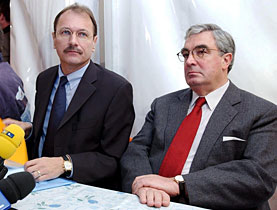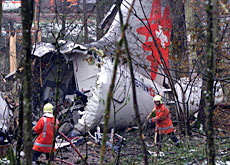Crossair bosses face damaging allegations

The trial has opened of two former Crossair executives accused of being responsible for one of the country's worst civil aviation disasters.
Airline founder Moritz Suter and its head at the time, André Dosé, on Monday rejected accusations of negligence in relation to the 2001 crash that killed 24 people near Zurich.
They are facing charges of negligent homicide and bodily injury at the Federal Criminal Court in the southern town of Bellinzona.
Others accused include Crossair’s former operations manager, chief pilot, head flight instructor and head of the then-new fleet of Avro RJ100 aircraft.
The crash claimed the lives of three prominent Israeli citizens and of German-based singer Melanie Thornton.
The prosecution’s case against Suter and Dosé includes charges of recklessness, intimidation and encouraging pilots to break safety regulations.
Both former executives have maintained their innocence in connection with the crash at Bassersdorf. The 64-year-old Suter has insisted the company took safety seriously. “Safety was our top priority,” he said.
Safety violations?
Dosé, who stands accused of having severely breached security rules and correct management procedures, also defended himself before the media.
“I have always worked carefully and conscientiously,” he said before the opening of the trial.
Lawyers for Suter and Dosé will argue their clients’ innocence during the second week of what is expected to be a two-week trial. If convicted, the two executives face up to three years in prison or a fine.
Any fine levied on the two executives would be based on their earnings and net worth.
Suter, who founded the Basel-based Hello regional airline, is worth around SFr8.5 million ($8.05 million) and earns an annual SFr450,000.
Dosé, now the owner of a consultancy firm, reported an income of SFr200,000 per year.
Human error
Switzerland’s civil aviation authorities blamed the 2001 accident on human error and specifically pointed the finger at the mistakes of an overtired 57-year-old captain.
The report said the pilot had worked a 13-hour day and had also exceeded the maximum duty time for the two days leading up to the accident.
The British-made regional jet crashed into a hilly wooded area in bad weather 2.5 kilometres short of Zurich Kloten airport.
Proscecutor Carlo Bulletti must prove that decisions made by executives directly contributed to the crash, which nine people survived.
Suter, then chairman, stepped down when the company was restructured in 2001 and became Swiss International Air Lines.
Dosé stayed with the revamped firm but left after it failed to make a profit.
swissinfo with agencies
Jacqueline Badran, one of the nine crash survivors, says she is sceptical about whether the airline industry in Switzerland has learned its lesson.
Badran suffered a broken hand, a tendon tear and bruises on her entire body as a result of the accident.
She, along with every other survivor, had been seated in the back of the cabin.
She has become something of an unofficial representative for victims of the air disaster.
She believes that the safety standards of the new Swiss International Airlines, Crossair’s new incarnation, might not be any better than in 2001.
“I’m not sure that Swiss’s standards are exceeding those of Crossair,” she said. “Swiss took over Crossair’s mentality.”
Badran is also concerned over the impact that ever-lower ticket prices will have on safety.

In compliance with the JTI standards
More: SWI swissinfo.ch certified by the Journalism Trust Initiative










You can find an overview of ongoing debates with our journalists here . Please join us!
If you want to start a conversation about a topic raised in this article or want to report factual errors, email us at english@swissinfo.ch.